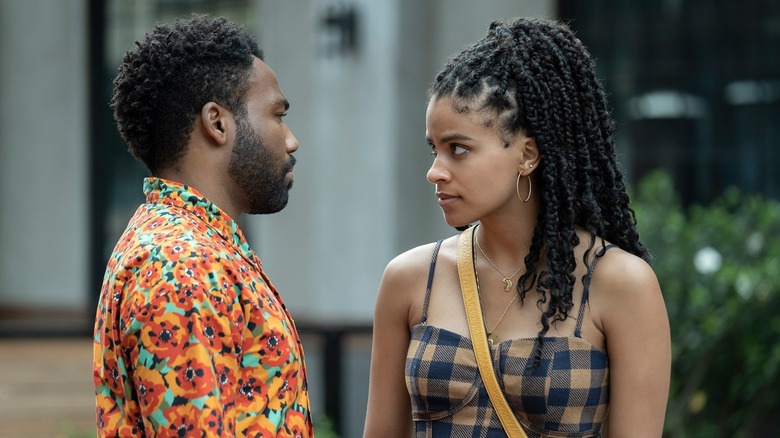Adventure Time Served As The 'Structural Godfather' For Donald Glover's Atlanta
Donald Glover's FX series "Atlanta" was a surreal and winding rollercoaster that departed from conventional television further and further with each subsequent episode. The show felt totally unique, perhaps because of its broad amalgam of influences. The series' creators took lots of inspiration from some pretty unexpected places, some of which might even surprise the show's biggest fans.
The dream-like nature of "Atlanta" has prompted a natural comparison to David Lynch's cult classic mystery series, "Twin Peaks." According to Glover, this likeness was totally intentional. "I just always wanted to make 'Twin Peaks' with rappers," he told Vulture in 2016. As it turns out, Glover had always planned to detach the show from reality over time. "Television shows are like novels, You just got to invest in them," he explained. "The tone of this, it's going to take people time to figure out what's going on, which I think is a good thing."
The narrative focus of "Atlanta" meanders and floats around, which is another highly unconventional choice. This move was definitely intentional for Hiro Murai, who directed more than half the episodes in the series and also served as a producer on the show. "The structural godfathers of this show are shows like 'Louie,' and even 'Adventure Time,' to an extent," Murai revealed to MTV in 2016.
"I brought up Adventure Time a fair amount with Donald when we were working on the show because Adventure Time does a very strange thing where it's very world-based. Sometimes the main characters won't even appear in an episode and the story will sort of detour with some side character. It has a very meandering feel that I really like, and there's something about that cadence that makes it more digestible, or you're more willing to go with the flow."
Atlanta took on the 'meandering feel' of Adventure Time
Some of the most unforgettable episodes of "Atlanta" feature side characters as the main focus, including the season 3 finale episode, "Tarrare," which follows Vanessa abroad and adrift in France. The show started departing from the main cast of characters — and their plane of reality — in season 3, with episodes like "The Big Payback." This episode follows a white man who is forced to pay reparations when his ancestry is traced back to slave owners.
"Adventure Time" makes similar departures from the main characters Finn and Jake with episodes like "Princess Day," which follows Princess Bubblegum and her princess cohorts. The show extends its universe even further in "Ring of Fire," an episode that follows the minor characters Tree Trunks, the soft-spoken green elephant, and features none of the main characters.
The animated series wasn't the only major influence for "Atlanta." The series creators also took influence from more conventional sources. "I think Donald is really good at weaving a traditional aesthetic with an experimental aesthetic," Murai said. "He knows what works with shows like 'Seinfeld' and classic sitcoms. The Darius character [in Atlanta] could be someone who really is in the same tradition as Kramer [...]"
The director wasn't sure he wanted to perfectly imitate the iconic "Seinfeld" character, though. He was hoping to, potentially, breathe new life into the trope. "[H]ow do we take that character and put him in a world where you accept that he's a real human being and not a sitcom character?" Murai asked. "Or do you even need to do that?" These familiar tropes ground the show in the accepted reality of television and allow for more unexpected choices, like bouncing around the show's universe, without losing the viewer's attention.
'Atlanta' was contemplative, but didn't disregard convention
The "Atlanta" director has always been interested in unconventional, meditative, and visually compelling narratives. Murai has been a huge fan of Japanese filmmaker Takeshi Kitano since high school, he told Juxtapoz in 2015.
"I think I saw Sonatine first, and I remember being completely befuddled by the tone of the movie. I couldn't tell if these weird, meandering scenes were supposed to be funny or dramatic or melancholic. There'd be long contemplative shots of nothing, punctuated with sudden jolts of violence. Main characters would die with no warning, but the whole thing would play out like a deadpan joke. It felt like a story being told by someone who couldn't tell the difference between a dramatic, story-altering event and some mundane detail, with everything being told in this same expressionless tone. I was completely obsessed."
It's hard not to notice how much this description reads like an analysis of "Atlanta." The tone of the series is both emotionally poignant and dryly comedic, and it subverts the viewer's anticipation at every turn. As fate would have it, the similarities between "Atlanta" and Kitano's films might not be an accident. "I spent a lot of time in high school trying to make short films that ripped off his style," Murai admitted. "I think I still rip him off to this day."
The guiding influences of "Atlanta" are as eclectic as the show itself. The series' creators pulled interesting elements from everywhere from "Twin Peaks" to "Seinfeld" to Japanese cinema and created something totally and profoundly unique. "Atlanta" broke the boundaries of television, all because it decided to be more like "Adventure Time."


